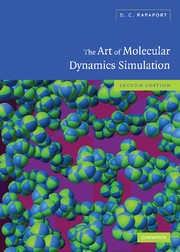Book contents
- Frontmatter
- Contents
- Preface to the first edition
- Preface to the second edition
- About the software
- 1 Introduction
- 2 Basic molecular dynamics
- 3 Simulating simple systems
- 4 Equilibrium properties of simple fluids
- 5 Dynamical properties of simple fluids
- 6 Alternative ensembles
- 7 Nonequilibrium dynamics
- 8 Rigid molecules
- 9 Flexible molecules
- 10 Geometrically constrained molecules
- 11 Internal coordinates
- 12 Many-body interactions
- 13 Long-range interactions
- 14 Step potentials
- 15 Time-dependent phenomena
- 16 Granular dynamics
- 17 Algorithms for supercomputers
- 18 More about software
- 19 The future
- Appendix
- References
- Function index
- Index
- Colophon
14 - Step potentials
Published online by Cambridge University Press: 28 February 2011
- Frontmatter
- Contents
- Preface to the first edition
- Preface to the second edition
- About the software
- 1 Introduction
- 2 Basic molecular dynamics
- 3 Simulating simple systems
- 4 Equilibrium properties of simple fluids
- 5 Dynamical properties of simple fluids
- 6 Alternative ensembles
- 7 Nonequilibrium dynamics
- 8 Rigid molecules
- 9 Flexible molecules
- 10 Geometrically constrained molecules
- 11 Internal coordinates
- 12 Many-body interactions
- 13 Long-range interactions
- 14 Step potentials
- 15 Time-dependent phenomena
- 16 Granular dynamics
- 17 Algorithms for supercomputers
- 18 More about software
- 19 The future
- Appendix
- References
- Function index
- Index
- Colophon
Summary
Introduction
Practically all the case studies in this book involve systems whose interactions are expressed in terms of continuous potentials. As a consequence, the dynamical equations can be solved numerically with constant-timestep integration methods. If one is prepared to dispense with this continuity another route is available that offers several advantages, although it has its weak points as well. The alternative method is based on step potentials; hard spheres are the simplest example, but the method can be extended to include potentials that have the shape of square wells or barriers, and even flexible ‘molecules’ can be built. Quantitative comparisons with specific real substances are obviously not the goal here, although comparisons with simple analytical models are possible. In fact, the earliest MD simulations [ald58, ald59, ald62] were of this kind, motivated by a desire to test basic theory.
A limitation of the methods used for continuous potentials, all of which involve a constant timestep Δt, is that they require the changes in interactions over each timestep to be small, otherwise uncontrolled numerical errors can suddenly appear. While this does not usually affect equilibrium studies, because Δt can be made sufficiently (but not too) small that for a particular simulation (namely, a given potential function, temperature and density) the results are predictably stable, systems that are inhomogeneous because of, for example, a large imposed temperature gradient, may prove problematic unless Δt is made unacceptably small.
Information
- Type
- Chapter
- Information
- The Art of Molecular Dynamics Simulation , pp. 391 - 417Publisher: Cambridge University PressPrint publication year: 2004
